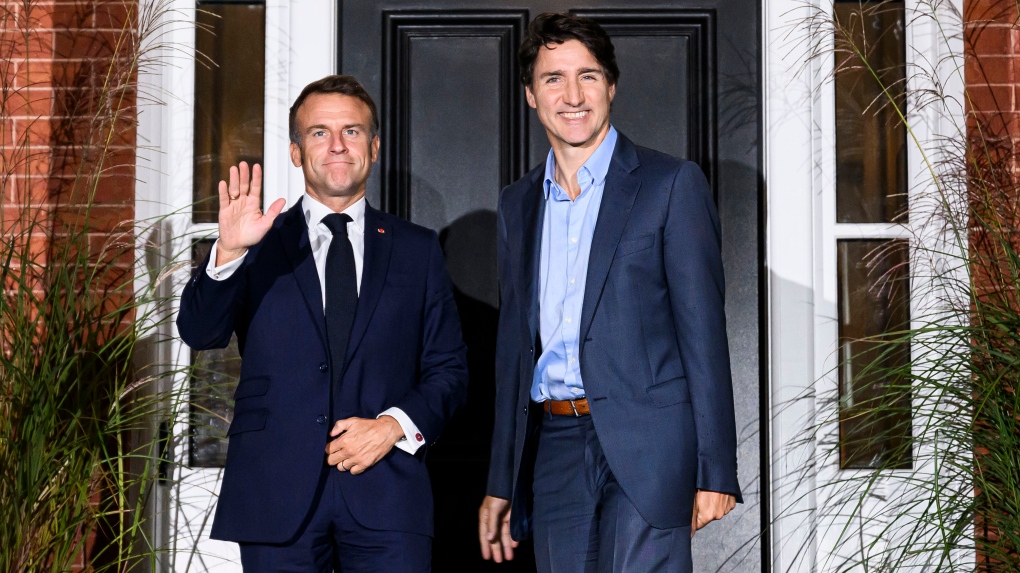ottawa –
French President Emmanuel Macron and Prime Minister Justin Trudeau say they will further cooperate on issues ranging from the Ukraine war to foreign interference, as their governments confront the rise of populism and misinformation.
“In these difficult times, we have a very united policy,” Macron said in French during a visit to Parliament Hill on Thursday, thanking Trudeau for his “hospitality and especially our common vision.” .
Macron arrived Wednesday night for short visits to Ottawa and Montreal, where he discussed a number of issues, from the French language and ocean protection to Haiti’s gang crisis and national defence.
Regarding Haiti, Macron announced that after two years of Trudeau’s plans, Paris would impose sanctions on some of Haiti’s political and economic elites, who Canada and the United States have banned from financial transactions due to their support for the gangs terrorizing the country. He hinted that France might finally respond to such demands.
“As we have discussed ourselves (in France) and within the European institutions, we will take the necessary measures in terms of sanctions and equipment,” Macron told reporters in French.
They also discussed escalating violence between Israel and Lebanon and efforts led by France and the United States to reach a three-week ceasefire, which Israel has rejected despite support from G7 and Gulf states. President Macron said he did not consider the initial rejection to be Israel’s final response to the proposal.
The visit follows the French Senate’s vote in March to reject the European Union-Canada trade deal against Macron’s wishes.
He said “anger has flared” over the deal, known as CETA, but noted that much of it is in place and is facilitating trade between France and Canada, adding that he expects the deal to be fully implemented. We are confident that this will be implemented.
“If someone is against CETA today, it’s someone who doesn’t want to sign a trade deal with anyone again, because CETA has the highest standards of any agreement we’ve ratified,” Macron said in French. Because I have it,” he said.
After an official meeting at Parliament House, Macron flew to Montreal and was scheduled to meet with Quebec Premier François Legault on Thursday afternoon to discuss artificial intelligence.
Both governments have overseen measures to limit the role of religion in public life.
Since 2004, France has had a law banning the wearing of visible religious symbols and clothing, such as hijabs, kippahs and large Christian crosses, in public schools. Such policies have inspired laws like Quebec’s Bill 21, which has blocked Muslim women from many government jobs since 2019.
President Macron lamented that France’s policies have been lampooned in the English-speaking world, causing a polarizing debate. President Macron said, “French’s model of secularism is not a model of religious exclusion,” and stressed that France would not impose this model on other countries.
“We welcome it if it inspires[others]but everyone must pursue their own model in a democratic way,” and living together in harmony based on local history. he said.
Both Trudeau and Macron are facing growing discontent and populist movements questioning their countries’ policies on climate change and immigration. Macron’s allies lost control of parliament this summer in snap elections in which left-wing and right-wing parties saw high turnout.
Prime Minister Justin Trudeau continues to languish in opinion polls as a surge in short-term immigration exacerbates dissatisfaction with housing costs.
Meanwhile, the two leaders on Thursday endorsed a joint statement on “strengthening defense and security partnership.”
The statement builds on efforts dating back to the D-Day landings 80 years ago, pledging to “combat foreign interference and information manipulation.”
It pledges to “strengthen cooperation in the field of military equipment support and training to Ukraine” and to uphold continued efforts to return children abducted by Russia.
“Canada and France will support Ukraine for as long as necessary to stop Russia’s war of aggression,” the statement said, but unlike previous Canadian statements, it did not refer to a complete victory for Ukraine. I haven’t.
The two leaders said the statement would “enable us to provide more effective support to Ukraine.”
In the Indo-Pacific region, the two countries will enhance “strategic and military analysis” and consider opportunities for joint patrol missions, including the possibility of integrating Canadian support with the deployment of French aircraft carriers.
The two countries will also strengthen communication to better respond to “foreign interference operations and information operations.”
President Macron and Prime Minister Trudeau were in New York earlier this week for the opening of the United Nations General Assembly and are scheduled to meet again next week, this time in France for the Francophonie Summit.
Macron last visited Canada in 2018 for the G7 summit, but this is the first official solo visit by a French president to Canada in 10 years.
This report by The Canadian Press was first published Sept. 26, 2024.
With files from Emily Bergeron of Montreal.

